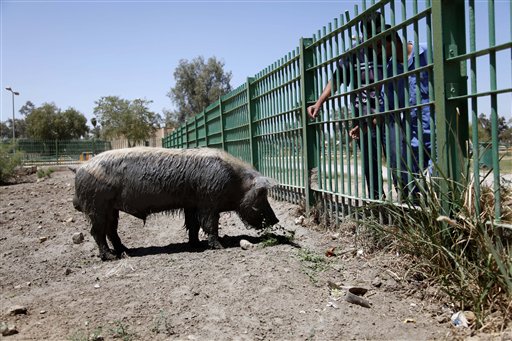
May 2, 2009
Have some people lost all reasoning? Who will speak up for the innocent animals mowed down in this hysteria?
In this photo taken Monday, April 27, 2009, people feed a boar at the Baghdad Zoo, Iraq. (AP Photo/Hadi Mizban)
The Baghdad Zoo is a zoological collection located in Baghdad, Iraq, in the Al Zawraa Gardens area, which also includes the Zawraa Amusement Park and Zawraa Tower. It once housed 650 animals of an unspecific smaller number of species. Many were killed in the 2003 invasion of Iraq.
Out of the original 650 animals in the Baghdad Zoo only 35 survived to the eighth day after the American invasion, and these tended to be larger animals. Several lions escaped from the abandoned zoo, and were rounded up by American soldiers in armored fighting vehicles.
The zoo and surrounding park reopened to the public on July 20, 2003, following improvements and renovations by US Army engineers and featured 86 animals, including 19 surviving lions.
Now Iraq has announced it will kill three wild boars (Sus scrofa) in the Baghdad Zoo to “ward off the new flu sweeping the globe,” officials said, despite experts’ advice that people are spreading the virus, not pigs, reports Reuters.
Dr. Ihsan Jafar, who heads Iraq’s committee on what the World Health Organisation calls influenza A (H1N1) but is widely known as swine flu, said on Friday, May 1st that a request was sent to Baghdad municipality to cull the hogs as soon as possible.
“It is…possible the disease could be spread by eating pork, so we banned hunting wild boars,” regional health minister Abdul Rahman Osman (incredibly) said. Most Iraqis are Muslim and do not eat pork, but a Christian minority does.
Iraq has registered no cases of the flu, which global health experts say derives from a swine influenza but has not been found in pigs.
In an effort to halt misinformation linking the virus to pigs, the World Health Organisation (WHO) renamed it Influenza A on Thursday. It has consistently said the disease cannot be caught from eating pork if it is prepared properly.
Still, Egypt on Thursday started seizing and slaughtering herds of pigs as precaution against the flu in a campaign the United Nations called a “real mistake”.
In Egypt, even the editor of a pro-government newspaper criticized the order to slaughter the estimated 300,000 pigs, which was pushed by parliament and issued by the government.
“Killing (pigs) is not a solution, otherwise, we should kill the people, because the virus spreads through them,” wrote Abdullah Kamal of the daily Rose El-Youssef. “The terrified members of parliament should have concentrated on asking the government first about the preventive measures and ways of confronting the problem.”
Many accused the Egyptian government of not taking precautions when bird flu first appeared in Asia in 2003. When the first case appeared in Egypt in 2006, the government carried out mass bird culls (25 million birds within a few weeks), but the disease has killed more than two dozen people since.
Meanwhile, back in Iraq, on the newest flu outbreak…
“We know this virus is spreading by human to human transmission but we can’t say ‘don’t take these secondary measures’, which any country in the world would take,” Jafar said, defending the planned boar slaughter.
(Reuters reporting credited to Aseel Kami and Tim Cocks, with editing by Richard Meares from Iraq; AP’s Tarek El-Tablawy from Egypt.)
🙂 Thank You.
About Loren Coleman
Loren Coleman is one of the world’s leading cryptozoologists, some say “the” leading living cryptozoologist. Certainly, he is acknowledged as the current living American researcher and writer who has most popularized cryptozoology in the late 20th and early 21st centuries.
Starting his fieldwork and investigations in 1960, after traveling and trekking extensively in pursuit of cryptozoological mysteries, Coleman began writing to share his experiences in 1969. An honorary member of Ivan T. Sanderson’s Society for the Investigation of the Unexplained in the 1970s, Coleman has been bestowed with similar honorary memberships of the North Idaho College Cryptozoology Club in 1983, and in subsequent years, that of the British Columbia Scientific Cryptozoology Club, CryptoSafari International, and other international organizations. He was also a Life Member and Benefactor of the International Society of Cryptozoology (now-defunct).
Loren Coleman’s daily blog, as a member of the Cryptomundo Team, served as an ongoing avenue of communication for the ever-growing body of cryptozoo news from 2005 through 2013. He returned as an infrequent contributor beginning Halloween week of 2015.
Coleman is the founder in 2003, and current director of the International Cryptozoology Museum in Portland, Maine.
Filed under CryptoZoo News, Weird Animal News